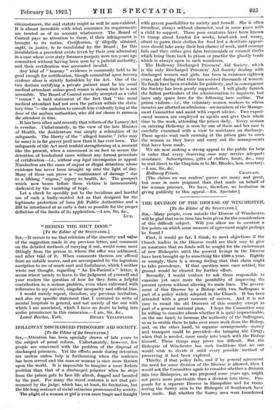HOLLOWAY DISCHARGED PRISONERS' AID SOCIETY. [To the Editor of the
SPECTATOR.]
SIR,—Attention has been specially drawn of late years to the subject of penal reform. Unfortunately, however, few people are concerned with the problem of the disposal of discharged prisoners. Yet the efforts made during detention are useless unless help is forthcoming when the sentence has been served and the man or woman is once more thrown upon the world. It is impossible to imagine a more forlorn position than that of a discharged prisoner when he steps from the prison gate to face life afresh, dogged and haunted by the past. For many the worst sentence is not that pro- nounced by the judge, which has, at least, its limitation, but the life-long sentence of social ostracism pronounced by society.
The plight of a woman or girl is even more tragic and fraught with graver possibilities to society and herself. She is often friendless, always without character, and in some cases with a child to support. These poor creatures have been known to tramp about London for weeks, heart-sick and weary, afraid to pawn their clothes for food lest a destitute appear- ance should take away their last chance of work, until courage fails and they either give false testimonials or commit thefts which bring them back to prison or practise the ghastly trade which is always open to such wanderers.
The Holloway Discharged Prisoners' Aid Society, which is the only Discharged Prisoners' Aid Society dealing with discharged women and girls, has been in existence eighteen years, and during that time has assisted thousands of women. No funds have been available for publicity, and in consequence the Society has been poorly supported. I will gladly furnish the fullest particulars of the administration to inquirers, but have only space here for the following bare outline. The prison visitors—i.e., the voluntary women workers to whom inmates are allotted on admission—are members of the Manage- ment Committee and assist with expert advice. Two experi- enced women are employed as agents and give their whole time to the work, attending the prison daily. Every woman on entering Holloway is seen by one of them and her ease is carefully examined with a view to assistance on discharge. These agents wait each morning at the prison gate to meet the women as they leave and carry out the arrangements that have been made.
We are now making a strong appeal to the public for help in order that every deserving case may receive adequate assistance. Subscriptions, gifts of clothes, boots, &c., may be sent direct to the Chaplain or to Mr. Rhodes, hon. secretary. —I am, Sir, &c.
[The claims on our readers' purses are many and great, but none is more poignant than that made on behalf of the woman prisoner. We have, therefore, no hesitation in giving publicity to this appeal.—En. Spectator.]










































 Previous page
Previous page